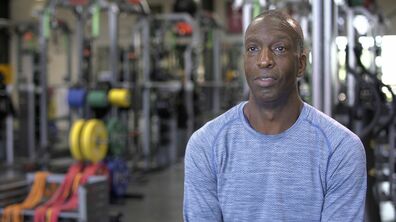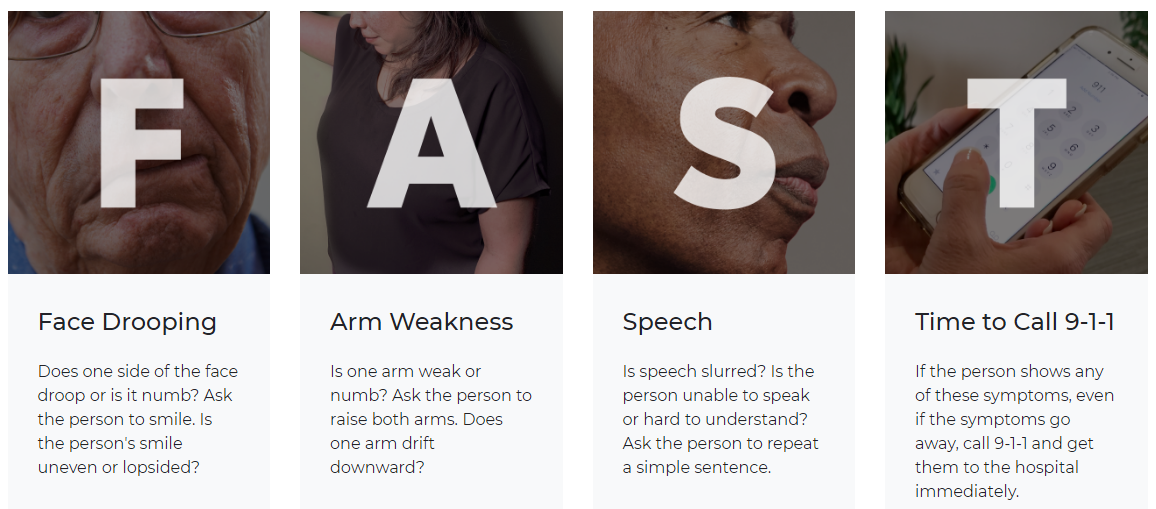 Champion sprinter’s quick reaction to his stroke is a big reason for his stellar recovery By Nancy Brown, CEO, American Heart Association When you think of track and field legend Michael Johnson, several things probably come to mind. There’s Olympic greatness, as evidenced by his four gold medals. There’s the flair he showed at the 1996 Games in Atlanta, wearing gold shoes on his way to a world record at 200 meters and an Olympic record in the 400 meters. And there’s the nickname he earned for being so dominant for so long: “Superman.” But if searching for a single word to describe all of the above, a fitting label would be “fast.” Hold that thought. May is American Stroke Month, a time to pay closer attention to the No. 5 killer of Americans and a leading cause of adult disability. Olympic great Michael Johnson wants you to think F.A.S.T. My organization – the American Heart Association, which includes the American Stroke Association – uses the occasion to boost awareness of the warning signs of a stroke. If you see someone experiencing face drooping, arm weakness or speech difficulty, then it’s time to call 911. The acronym that helps remember this is F.A.S.T. A speedy response can change the outcome. The sooner care is given, the better the recovery chances. The phrase doctors often use is “time lost can be brain lost.” Here’s how these threads tie together: Johnson recently became a stroke survivor. On Aug. 31, after a workout at his home, Johnson’s left side became weak. Instead of viewing himself as invincible, he sought immediate treatment. Doctors told him that his quick response is a key reason for his nearly full recovery. Johnson is sharing his story because he understands the many ways it can resonate. The most profound is perhaps the most obvious: Connecting this fast guy with F.A.S.T. offers another way to remember this potentially lifesaving information. “I’ve known for a very long time that I have the ability to impact other people with my platform and what I’ve accomplished,” Johnson said. “So this being another wrinkle in the story of my life and being a part of who I am, it wouldn’t seem normal for me not to share this and try to use it where there needs to be more awareness about prevention and what to do if you are so unfortunate to have a stroke.” Johnson’s tale began following a workout at his home in Malibu, California. His left foot felt strange, then his left arm tingled. When it twitched, he began seeking answers. At the UCLA Medical Center in Santa Monica, an MRI revealed that a blood clot had settled into the base of his brain on the right side, preventing blood flow long enough to cause damage, then dissolved. What remained were the questions of if, when and how much he’d recover. Johnson’s problems were mostly with his arms and legs. He had to rest for two days before beginning rehab. With his speech and mind unharmed, he spent his downtime pondering questions such as:
Another unknown is the source of his stroke. Extensive testing never found a cause. His stroke was thus labeled “cryptogenic,” which happens in one of every three strokes. Johnson isn’t worried about another stroke. He’s controlling what he can, which means following doctor’s orders such as continuing to exercise, eating a healthy diet and trying to reduce stress. “I’ve been fortunate to always have been in a really good life and I enjoy life,” he said. “I get to do the things that I enjoy and be around the people that I want to be around and do the kind of work that brings me joy.” These days – and, especially, this month – his joy also comes from spreading the word that anyone can have a stroke, and from sharing the warning signs.and laugh at how perfect of a pitchman he is for F.A.S.T.It’s consistent with who I am,” he said. Michael Johnson (right) working with a client at Michael Johnson Performance. Photo courtesy of Michael Johnson Performance.
1 Comment
|


